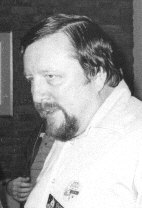[An obituary of the Anglo-Irish science fiction writer, Bob Shaw, written by CP in 1996 for David Langford’s monthly newszine Ansible. A note of some of Bob Shaw’s books still in print appears at the end of the page. David Pringle once nominated Shaw as the best pure science fiction writer of all, which is difficult to dissent from. This article may be downloaded, but may not be uploaded or printed elsewhere.]
 Suddenly, the laughter fades away — Bob Shaw has died.
Suddenly, the laughter fades away — Bob Shaw has died.
Bob was born in Northern Ireland in 1931, one of three brothers. He trained as a structural engineer, but also worked as an aircraft designer and journalist. Although he and his first wife Sadie lived in a middle-class suburb of Belfast the political situation had adverse potential for their children, and he felt forced to move to England in the mid 1970s. The upheaval, together with his step into full-time authorship at about the same time, brought financial worries that never left him. Even so, over the next twenty years he continued to produce a stream of literate, original and superbly imagined novels and stories. Bob Shaw was the master of the telling detail. His fan-writing, which had earlier made his name in science fiction fan circles, was fluent, amusing, intelligent, personal and pertinent. As an attender of conventions Bob was always quite simply the most popular person there: habitually in the bar, surrounded by friends of every age and background, he endeared himself to all who spoke to him. These elements of his life came memorably together for a few seconds at the world sf convention where he won his first Hugo: this large and ungainly man danced joyfully across the stage and everyone cheered him to the rafters.
Bob and I became friends and sometimes visited each other’s houses. We didn’t spend as much time in bars as his reputation as a tippler would suggest, and maybe this let me see an extra side to him. I found him a thoughtful and rather melancholy man, a bemused observer of the world, wry in his comments, quizzical in his approach to life. His wit was legendary, but it was self-effacement revealed through quickness of the mind. Such quiet humour is not wildly funny, but can be extremely endearing.
This gentle and congenial man, who gave so much pleasure to everyone else, had to contend with the darker side. Although he later denied it, he divulged to me that he was an alcoholic and was unable to fight it. His ‘serious scientific talks’, so popular with convention fans, also had a downside for Bob. He found the talks difficult to write, often struggled with them for weeks, and sometimes even hesitated to register for conventions, lest he be expected to perform his famous party-piece. After a serious eye-infection Bob developed a morbid fear of blindness which lasted for the rest of his life. He became afraid of the dark and told me he always slept with a light on. Although he was older than me, and much larger, I often felt protective of him.
One cold day in his home town of Ulverston he took me for a long walk through the backstreets, ending up outside a nondescript terraced house. It was Stan Laurel’s birthplace. ‘The funniest man in the world,’ Bob said sadly, ‘and the people who live there don’t know who he was and won’t allow a plaque on the wall.’ I don’t think he was drawing a moral, but afterwards I could never hear people laughing at Bob’s jokes without remembering that.
Nothing I can say about him is equal to my feeling of loss at his death, and the knowledge that so many other people feel the same only makes it worse.
Currently available books by Bob Shaw include A Wreath of Stars and Orbitsville.